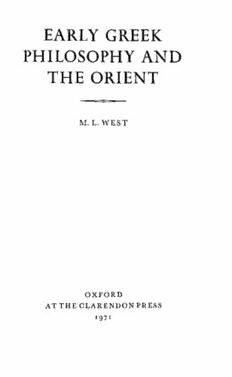
Early Greek Philosophy and the Orient PDF
Preview Early Greek Philosophy and the Orient
EARLY GREEK PHILOSOPHY AND THE ORIENT M.L. WEST OXFORD AT THE CLARENDON PRESS 1971 EARLY GREEK PHILOSOPHY AND THE ORIENT Oxford University Press, Ely House, London W. 1 GLASGOW NEW YORK TORONTO MELBOURNE WELLINGTON CAPE TOWN SALISBURY IBADAN NAIROBI DAR ES SALAAM LUSAKA ADDIS ABABA BOMBAY CALCUTTA MADRAS KARACHI LAHORE DACCA KUALA LUMPUR SINGAPORE HONG KONG TOKYO (© OXFORD UNIVERSITY PRESS I97I PRINTED IN GREAT BRITAIN AT THE UNIVERSITY PRESS, OXFORD BY VIVIAN RIDLER PRINTER TO THE UNIVERSITY TO WALTER BURKERT PREFACE Inis is a work of construction. It aims on the one hand to ad- vance the understanding of several early Greek writers, by new interpretations and combinations; on the other, to raise the subject suggested by the title out of the disrepute into which it has fallen, by bringing fuller documentation, avoiding vagueness, and employing a properly philological and his- torical approach to what are eminently philological and historical problems. The discussion of Pherecydes of Syros is a development from the one published in CQ 57, 1963, 157-72: I have thought every- thing out afresh, added new evidence, and, I hope, achieved a much improved acccunt of this intriguing figure. In leaving the comparative material out of account until I have finished with the Greek sources, I have followed a principle that obtains throughout the book, and one which ıs necessary to avoid the suspicion of circularity. The outcome is that three of the seven chapters are concerned wholly with Greek evidence. It is no doubt an impertinence to publish the other four with- out having made myself a master of Egyptian, Akkadian, Hebrew, Avestan, Pahlavi, and Sanskrit, not to mention other languages of incidental relevance. But I have enjoyed the criti- cism of such expert orientalists as Professor J. W. B. Barns, Professor Sir Godfrey Driver, Dr. Ilya Gershevitch, Mr. W. G. Lambert, and Mrs. Wendy O'Flaherty, all of whom generously gave time to reading and discussing the parts that touched their fields. Thanks to them I may hope to have got my facts straight, whatever may be thought of my inferences. Walter Burkert had the goodness to read a draft of the whole, and it owes much besides to the example of his published works. It is dedicated to him in gratitude and friendship. M. L. W. University College, Oxford September 1970 CONTENTS LIST OF ILLUSTRATIONS EXPLANATION OF ABBREVIATIONS xlii 1. PHERECYDES AND HIS BOOK Biographical data, r. The book, 4. Transmission, title, 7. The three pre-existing deities, 9. Chaos, 11. The five nooks, 12. The wedding of Zas and Chthonie, 15. Ophioneus, the theomachy, 20. Cosmography, eschatology, 24. The tree, 27. 2. PHERECYDES THE SYNCRETIST 28 The seed of Time, 28. Zurvan, 3o. Kala, 33. Oriental ante- cedents, 34. The five nooks, 36. The theomachy, 40. The names Ogenos and Zas, 50. The wedding, 52. The tree, 55. Metem- psychosis, 60. Ambrosia in the moon, 62. The theomachy paralleled in Greek cult, 68. The victor's crown, 70. The tree and the robe, 72. Pherecydes the syncretist, 74. 3. ANAXIMANDER AND ANAXIMENES 76 The Boundless, 78. Worlds, 80. Time's ordinance, 81. The formation of the present world, 83. The arrangement of the rings. The earth, 85. Oriental elements in Anaximander's world- model, 87. Oriental elements in the cosmogony, 93. Anaximander the debtor, 96. Meteorology, 97. Anaximenes’ Aer, 99. Aer's progeny, 101. The motion of the heavenly bodies, 102. Anaxi- menes' affinities, 104. 4. HERACLITUS (1): 6YZIKOZ AOTOS What was Heraclitus? 111. A conjectural opening sequence of fragments, 113. Fragment 1 (B 1), 114. Fragment 23(a) (B 114 and 2), 117. Fragment 24 (B 89), 119. Fragments 51, 53, 54, 33 (B 30, 31, 90, 60), 120. No ‘Logos-doctrine’ in Heraclitus, 124. The world a fire, 129. The changes of fire, 130. The ‘exhalations’, 131. The cycle completed, 135. 5. HERACLITUS (2): GODS AND MEN 137 Dike and Eris, 137. Opposites, 138. τὸ σοφόν, 140. The thunder- bolt, 142. God and fire not the same, 144. Other gods, 144. Sleep, 147. The soul, 149. Birth and death, 151. The cycle of generation, 154. The great year, 155. Aion, 158. Consequences for morality, 160. x CONTENTS 6 HERACLITUS AND PERSIAN RELIGION 165 Quaestio perpetua, 165. Pitfalls, 170. Fire, 170. The interchange of elements, 173. The sun, 175. Dike, 176. The Wise, 180. Sleep, 183. Death, 183. Hades, 188. Strife, 189. The great year, 190. Resurrection, 192. The prophet, 192. ‘All this’, 196. The death of Heraclitus, 196. Conclusion, 201. 7. THE GIFT OF THE MAGI 203 Hesiod and Homer, 203. Alcman, 206. Thales, 208. The period of Iranian influence. Pythagoras, 213. Parmenides, 218. The closing of the sluice, 226. ‘Pythagoreans’, 229. Anaxagoras, 231. Empedocles, 233. Eleatics, atomists, and others, 235. Astronomy in the late fifth century, 237. Conclusion, 239. ADDENDA 243 INDEX OF PASSAGES DISCUSSED 245 GENERAL INDEX 252
